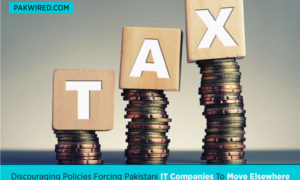It seems that Pakistan and prosperity just don’t seem to bode well together. Somehow or the other, in the near or distant future, there emerge such ridiculous official state policies which compel investors, both local and foreign, to relocate their entire establishments elsewhere.
Whether it is IT, Healthcare, Telecom, Media or even Agriculture, Pakistani companies have been bearing the brunt of draconian government policies ever since the previous government of Pakistan People’s Party (PPP) took charge. The environment, although apparently better under the current regime of Pakistan Muslim League Nawaz (PML-N), is not as conducive for promising investments as it is claimed to be.
A recent news report quoted Sajjad Syed, CEO of Excellence Delivered (ExD) Pvt Ltd as saying that nearly 40% if Pakistani IT companies had moved their business setups to the UAE. This, the report said, was largely because of the 8% additional tax on revenues imposed by the Government of Pakistan in 2015-16. What makes this revelation disturbing is that this could have been avoided, for better or for worse, but the government chose not to withdraw the additional tax.
What’s ironic about this development is that a 2015 World Bank report which ranked countries based on ‘Ease of Doing Business’, placed Pakistan above India, otherwise considered to be a popular investment destination in South Asia. The report placed Pakistan in 128th position, with India at 142nd. It noted that Pakistan was among select countries which improved electronic submission and processing of documents to conduct trade across the border i.e. giving leverage to local IT companies in customs clearance issues (with regards to the subject of this commentary).
The question is, how exactly is that additional 8% tax putting off Pakistani IT businesses?
For starters, the profit earned by Pakistani IT companies is not always stable and tends to remain at the lower end of the spectrum. We are also aware that enterprising startups need some leeway before such financial burdens are imposed on them. The imposition of such draconian taxes which will have to be paid at any cost is certainly discouraging, demotivating and demoralizing. Pakistan Software Houses Association (P@SHA) had stated in July 2015:
Such Minimum or even Revenue based taxes are not practiced in any of the leading marketplaces in the world and neither in any of the emerging investment destinations.
Secondly, we know that Pakistan’s somewhat infant IT sector has a considerable number of freelancers who, if very successful, end up establishing small or medium-level software houses or general IT service providers. For such rising companies to have the continuous threats of additional tax looming overhead will prove damaging in the long run. Consequently, most of these small setups are operated discreetly in residential areas (homes for rent) for tax evasion. If not, they continue working on sit-at-home gigs for foreign companies, earning direct salaries and not generating required revenues for the national exchequer.
Thirdly, the power crunch which Pakistan faces has significantly emptied company revenues by investing more in running diesel generators and UPS systems instead of looking forward. To keep their businesses running, most IT firms will either have to shelve some employees to balance the cost of maintenance of simply shift businesses elsewhere. The news report cited in the beginning mentions UAE in particular. This is because it is a modern Gulf state near Pakistan with several free trade zones in cities such as Ajman and Ras Al Khaimah (RAK). Besides tax exemptions, these havens provide the following benefits to foreign companies:
• Uninterrupted power supply
• Regional connectivity
• Assured returns
• High profitability
• Greater international exposure
• High-speed Internet access
Another irony is that despite rising to 97th position in the World Economic Forum’s Global IT Report 2015, Pakistan has decided to stamp on its feet and discredit its upward trajectory among investors and regional rivals. From what we’ve come to understand, the Ministry of IT & Telecommunications (MoITT) is ramping up efforts to woo foreign investment in this critical sector. Why are local pioneers sidelined and not being retained through helpful concessions?
Rather than trying to encourage local IT companies to expand nationally, the Government of Pakistan seems least bothered about them relocating their headquarters overseas. Ultimately, even foreign investors will think twice before paying extra tax for business activities besides paying for power generation and security costs.
We hope the government withdraws this additional tax to regain confidence lost on its aspirations to make Pakistan a knowledge-based economy. The light at the end of the tunnel is gradually getting darker.
image credit: shutterstock.com



